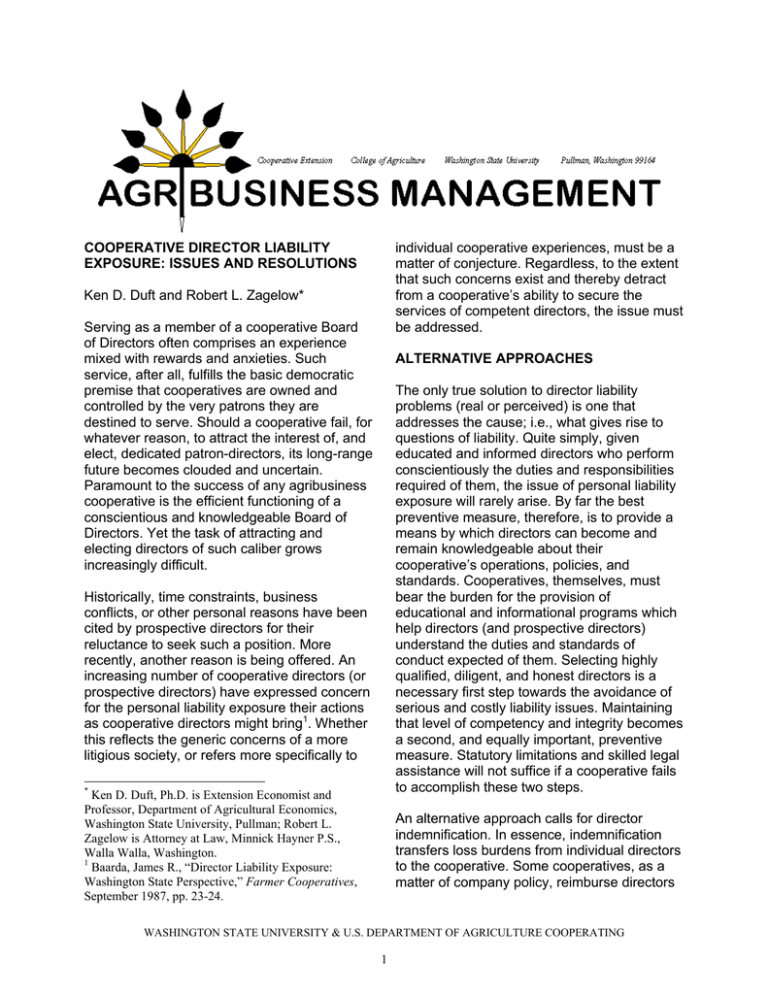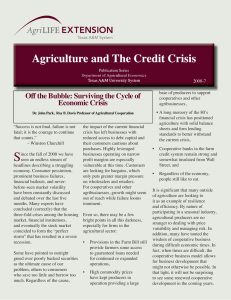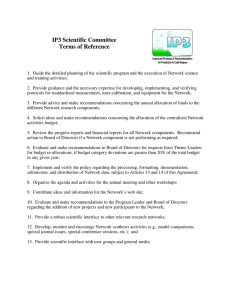COOPERATIVE DIRECTOR LIABILITY EXPOSURE: ISSUES AND RESOLUTIONS
advertisement

COOPERATIVE DIRECTOR LIABILITY EXPOSURE: ISSUES AND RESOLUTIONS individual cooperative experiences, must be a matter of conjecture. Regardless, to the extent that such concerns exist and thereby detract from a cooperative’s ability to secure the services of competent directors, the issue must be addressed. Ken D. Duft and Robert L. Zagelow* Serving as a member of a cooperative Board of Directors often comprises an experience mixed with rewards and anxieties. Such service, after all, fulfills the basic democratic premise that cooperatives are owned and controlled by the very patrons they are destined to serve. Should a cooperative fail, for whatever reason, to attract the interest of, and elect, dedicated patron-directors, its long-range future becomes clouded and uncertain. Paramount to the success of any agribusiness cooperative is the efficient functioning of a conscientious and knowledgeable Board of Directors. Yet the task of attracting and electing directors of such caliber grows increasingly difficult. ALTERNATIVE APPROACHES The only true solution to director liability problems (real or perceived) is one that addresses the cause; i.e., what gives rise to questions of liability. Quite simply, given educated and informed directors who perform conscientiously the duties and responsibilities required of them, the issue of personal liability exposure will rarely arise. By far the best preventive measure, therefore, is to provide a means by which directors can become and remain knowledgeable about their cooperative’s operations, policies, and standards. Cooperatives, themselves, must bear the burden for the provision of educational and informational programs which help directors (and prospective directors) understand the duties and standards of conduct expected of them. Selecting highly qualified, diligent, and honest directors is a necessary first step towards the avoidance of serious and costly liability issues. Maintaining that level of competency and integrity becomes a second, and equally important, preventive measure. Statutory limitations and skilled legal assistance will not suffice if a cooperative fails to accomplish these two steps. Historically, time constraints, business conflicts, or other personal reasons have been cited by prospective directors for their reluctance to seek such a position. More recently, another reason is being offered. An increasing number of cooperative directors (or prospective directors) have expressed concern for the personal liability exposure their actions as cooperative directors might bring1. Whether this reflects the generic concerns of a more litigious society, or refers more specifically to * Ken D. Duft, Ph.D. is Extension Economist and Professor, Department of Agricultural Economics, Washington State University, Pullman; Robert L. Zagelow is Attorney at Law, Minnick Hayner P.S., Walla Walla, Washington. 1 Baarda, James R., “Director Liability Exposure: Washington State Perspective,” Farmer Cooperatives, September 1987, pp. 23-24. An alternative approach calls for director indemnification. In essence, indemnification transfers loss burdens from individual directors to the cooperative. Some cooperatives, as a matter of company policy, reimburse directors WASHINGTON STATE UNIVERSITY & U.S. DEPARTMENT OF AGRICULTURE COOPERATING 1 BASIS FOR EXTREME CAUTION for legal expenses and other costs after or during litigation to which a director is party (assuming, of course, the litigation results from actions taken as a director). While this policy may address some of the concerns of the individual directors, it does little to protect the resultant exposure of the cooperative. Furthermore, an insolvent or otherwise financially troubled cooperative may lack the resources to indemnify its directors, thereby providing only illusory protection. As a general rule, newly elected cooperative directors are aware that the position to which they have been elected carries serious responsibilities and that under certain circumstances their actions, individually or as a board, may provide some personal liability exposure. If they are not aware, then they must be made aware that they are subject to suit by persons who feel the actions of the cooperative have caused them undue harm. The likelihood of such action may be miniscule, but becomes significantly more likely whenever directors permit or knowingly cause the cooperative to operate contrary to law, or to operate in a manner that contravenes a law. From a practical standpoint, the potential for litigation grows dramatically when cooperatives suffer serious financial losses or insolvency, in that members seek to know “what went wrong.” One area in which this potential takes on serious proportions relates to cooperatives’ actions vis-a-vis state and federal securities statutes. A third strategy is the use of insurance contracts to protect directors against personal liability or insure the cooperative when director indemnification is provided. While this strategy provides some overall protection, it is not without cost. Cooperatives normally purchase a single encompassing policy which protects both the company and its individual directors. Once again, at a cost, some form of protection is afforded, but only for specified actions. A fourth approach appears in the form of legislation to modify or limit director liability. The end product of such actions serves to lower the standard of care required of cooperative directors as they perform their prescribed duties. Effectively, such statutes exempt directors from personal liability for certain kinds of conduct for which they might otherwise be held liable and/or lower the standard of care imposed on directors. For purposes of illustration, a 1986 Federal District Court decision2 is used to demonstrate the sensitivity of issues addressed here. As early as 1959, Farmers Cooperative of Arkansas and Oklahoma began to issue “demand deposit notes” to members (and nonmembers) wishing to invest money in the cooperative. The notes issued promised to repay the investment at any time (on demand) plus a stated interest. The notes were neither insured by any outside party, nor secured by any collateral. By the time of Farmers Cooperative's bankruptcy in 1984, over $10 million had been invested in the cooperative by more than 1600 investors using the “demand deposit notes.” Holders of those notes found their investments were impaired at bankruptcy and filed a claim requiring that cooperative directors and officers should be personally required to compensate the depositors for It should be noted at this point that loss-limiting actions such as indemnification, insurance, and statutory limits on liability do not provide a form of “blanket” protection for cooperative directors. For example, protection is often provided for actions or inactions that could be described as negligent. Protection, however, is not provided for acts generally described as intentional, or conduct judged harmful to the cooperative and/or its members, such as selfdealing. Negligence, therefore, is rather narrowly defined to exclude actions or decisions knowingly taken in defiance of existing law or cooperative articles and bylaws. 2 FT 20001, Robertson v. White (635 F. Supp. 851, W.D. Ark. 1986) as reported by: Baarda, James R., “Directors Held Personally Liable in Arkansas Co-op Securities Case,” The Cooperative Accountant, reprinted from Farmer Cooperatives, ACS, USDA, January 1987. WASHINGTON STATE UNIVERSITY & U.S. DEPARTMENT OF AGRICULTURE COOPERATING 2 losses sustained. Their claim was based on an Arkansas Securities Act which required that securities be properly registered or exempted. under prescribed circumstances. However, the fact that Washington statutes are similar in concept to those in Arkansas leaves the issue largely unresolved and, given that status, provides a potential basis for director/cooperative liability. In their defense, the directors argued that they did not know that cooperative demand deposit notes were, in fact, securities requiring registration. Indeed, the directors argued, they had retained professional attorneys whose job it was to advise them of any legal problems associated with the program. Moreover, many agribusiness cooperatives remain reluctant to address this issue. The mere mention of “cooperative demand deposit accounts” is resisted. One industry spokesman has stated, “We should do all we can to discourage this type (of) terminology. Widespread use in conversation with the commercial lending community would only incite their greater resistance to cooperative cash credits interest bearing ledgers. This is their term for their business and serves only to remind them of deposits they don’t have3.” Yet another spokesman has stated, “I would prefer to not have this subject investigated and let sleeping dogs lie. I am of the opinion that it will continue for a number of years into the future as a satisfactory arrangement if someone doesn’t churn it up. If at some future date, we are attacked by the Banking Regulatory Commission, we will at that time, of course, be interested in defending the issue or else discontinuing the grower demand accounts4.” In regard to these deposits, even outside parties have expressed reservations, advising clients, “We recommend that you remove the funds from the account and invest them in either a federally-insured money market account with a bank, savings bank, or savings and loan, or invest them in a brokerage company sponsored money market account with government only securities5.” Despite the directors’ argument, the Court granted the investors summary judgment, noting that even if the directors’ position was found factual in a trial, they would still be held liable by law for not having registered or properly exempted the notes which were judged to be securities under Arkansas law. It is interesting to note that the directors’ pleading of ignorance of the securities statutes was treated by the Court rather brusquely, e.g.: “This ignorance will be bliss only to the extent that the (director) can prove that even by the exercise of reasonable care he would have remained ignorant . . . .” Directors’ reliance on their attorney’s advice was also rebuffed by the Court, e.g.: “One cannot delegate responsibility to his lawyer when a securities violation is alleged. One doing so is liable and is left with an action for contribution against his counselor.” WASHINGTON STATE FOREWARNED Our selection of the illustrative example, above, was not purely coincidental. The general practice described is not unique to Arkansas. A casual review of Washington State cooperative annual financial statements reveals entries such as “grower demand deposits,” “grower deposits in lieu of operating loans,” and “loans from patrons.” By whatever name, the terms suggest a means (other than traditional retained earnings) by which cooperative patrons have elected to invest/deposit funds in their cooperatives. This practice is not without merit. In fact, a very substantial case can be made for the continuation or even expansion of this practice A CAUTIOUS STATUTORY RESPONSE A real concern over the issue raised above, and many other director liability-related matters, has given rise to a cautious statutory response. According to one attorney who 3 “Members Cash Credits,” Cooperative Meeting, Yakima, May 23, 1986. 4 Copy of letter sent to Washington State Council of Farmer Cooperatives, October 22, 1985. 5 Advisory letter to clients by Washington-based firm of Certified Public Accountants, February 28, 1986. WASHINGTON STATE UNIVERSITY & U.S. DEPARTMENT OF AGRICULTURE COOPERATING 3 specializes in cooperative law, “As a result of the increase in litigation against directors, coupled with increasing director liability costs, there has been an exodus of qualified volunteer directors from the ranks of board members. In order to discourage this, some states have passed legislation which either automatically creates protection from lawsuits for directors or allows the corporation’s shareholders to create such protection by an amendment to the corporation’s Articles of Incorporation6.” In concert with this trend, Part VII of SSB 6048 was recently approved by the Washington State Legislature and allows cooperative Articles of Incorporation to contain a provision: In essence, this language creates some additional automatic protection of directors and officers against suits from outsiders by decreasing the standard of care from negligence to gross negligence. No amendments to the cooperative’s Articles of Incorporation are necessary to take advantage of this protection, as it simply exists as a matter of law under which the cooperative may be organized. A further expansion of this general theme can be found in the removal of subsection (16), Section 13, Chapter 282, RCW 21-20.320, as amended. In general terms this statute provides for “employee” cooperatives a form of exemption from securities registration requirements for those organizations “organized and operating under cooperative principles.” The securities division of the Department of Licensing, however, is given the authority to investigate organizations purporting to be cooperatives to ensure compliance9. “...eliminating the personal liability of a director to the association or its members for monetary damages for conduct as a director: PROVIDED that such provision shall not eliminate or limit the liability of a director for acts or omissions that involve intentional misconduct by a director or a knowing violation of law by a director, or for any transaction from which the director will personally receive a benefit in money, property, or service to which the director is not legally entitled. No such provision may eliminate or limit the liability of a director for any act or omission occurring before the date when each provision becomes effective7.” EXEMPTION VS. CORRECTIVE ACTION As we have seen, the state of affairs relating to cooperative director liability has grown increasingly complex and, perhaps even suspect. One is forced, once again, to consider the options afforded the cooperative entity. Quite clearly, preventative measures afford the most attractive alternative. Simply stated, cooperatives must solicit the interest of, and elect, conscientious, competent, and welleducated directors. Once elected, directors must be kept well informed in order that actions taken do not bring forward questions of personal liability. In addition, Washington has gone even further in the protection it affords officers and directors of cooperatives by providing that: “... a member of the board of directors or an officer of any nonprofit corporation is not individually liable for any discretionary decision or failure to make a discretionary decision within his or her official capacity as director or officer unless the decision or failure to decide constitutes gross negligence8.” Should additional protection be judged necessary, laws in most states specifically authorize a cooperative to purchase liability insurance, insuring its directors and officers. In this regard, several features must be noted. First, such coverage is not without cost - a cost which has grown substantially in recent years. Second, there exists no standardized package of coverage or policy format. Each insurer will provide differing coverage. Even within a 6 Franklin, Donald R. “Director and Officer Liability.” Franklin and Bersin, Seattle, WA. 7 Section (d), p.8, SSB 6148. 8 Under provisions of RCW 23.86, 24.06, or 24.32. 9 New Section 14, Chapter 458, Washington Laws, 1987, as approved May 18, 1987. WASHINGTON STATE UNIVERSITY & U.S. DEPARTMENT OF AGRICULTURE COOPERATING 4 particular insuring company, coverage afforded and costs may differ. Needless to say, cooperatives must carefully review all provisions and exclusions before purchasing a policy. Third, it should be understood that as a general rule the insurer does not have a duty to defend, only an obligation to pay the costs of such a service. Next, the director and/or officer generally has to finance the defense costs until reimbursed by the insurer. Some states do, however, authorize the cooperative to advance such expenses, subject to later reimbursement by the insurer. It should be noted that the costs of defense generally fall within, not in addition to, the policy limits specified. When director liability protection is afforded through indemnification, the cooperative, itself, may seek protective insurance coverage. Finally, directors must realize that indemnification rights are only as good as the financial soundness of the cooperative. and securities registration requirements have cast an ominous shadow on such programs. Cooperatives simply must address questions related to such programs if they and their directors are to be afforded a reasonable degree of liability protection. Some potential solutions are obvious and several cooperatives have already implemented measures which may lessen exposure to liability. For example, some cooperatives have disallowed deposits by non-active patrons and/or non-members. Others have developed advisory notes and consent forms for investors. Some cooperatives have converted the “on demand” nature of the credit to a longer-term debt instrument with a finite maturity. Still others have adopted a market-sensitive means by which rates paid on deposits are adjusted on a regular schedule. Finally, some cooperatives have activated programs specifically designed to provide a form of security in support of deposits, e.g., creating backup lines of credit, restricting the amount of deposits, or adopting account monitoring procedures designed to better manage the use of funds generated by such deposits. Whether or not these practices will eliminate state and federal regulatory concerns remains to be seen. Beyond such measures, of course, lies a course of action based on the search for exemptive privileges. Should a cooperative find itself in such a potentially volatile setting that it can no longer attract the services of competent directors, corrective measures are required. One such measure, of course, is to seek statutory exemptions for directors from some exposure to personal liability suits. Such efforts have, at least in Washington, proven partially successful. Yet such legislation remains largely untested, ambiguous in its focus and/or intent and leaves intact liability for gross negligence and certain intentional acts/omissions. Competent and informed directors, liability insurance, indemnification, and/or exemptive legislation will never remove, entirely, cooperative director liability exposure. Yet when utilized in a coordinated manner, and coupled with skilled legal and managerial counsel and corrective actions taken by the cooperative, this exposure can be minimized. Minimizing this exposure must be accomplished if cooperatives are going to be able to attract the interest of, and elect, directors of the caliber required to manage successfully cooperative operations in the future. A second, perhaps more attractive, measure is simply (or not so simply) to alter or remove from the cooperative’s operations those features, practices, or programs which contribute most towards the perceived (or real) sense of volatility. The practice of financing cooperative operations through the creation of grower demand deposit accounts is just one example of actions which might exacerbate director liability exposure. For a growing number of cooperatives, this feature has become increasingly important to the continued success of the cooperative. Yet individual state statutes, banking regulations, Ken D. Duft Extension Economist WASHINGTON STATE UNIVERSITY & U.S. DEPARTMENT OF AGRICULTURE COOPERATING 5






